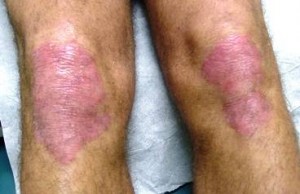Psoriasis is a chronic condition of the skin that can start at any point in a person’s life. It consists of scaly red spots, often on elbows, knees, scalp, and lower back. In some cases it causes nail changes, and in others it can be more widespread on the body, or in other areas of the body such as hands and feet only. It sometimes itches, and other times does not. There is scientific evidence to suggest genetic factors in the development of psoriasis,  though some patients report no family history of psoriasis. This disease has a tendency to come and go, which is commonly referred to as “flaring” and “going into remission”. Psoriasis is a condition without a cure, but it can be controlled with treatment, making flares and symptoms milder.
though some patients report no family history of psoriasis. This disease has a tendency to come and go, which is commonly referred to as “flaring” and “going into remission”. Psoriasis is a condition without a cure, but it can be controlled with treatment, making flares and symptoms milder.
There are many treatments for this condition, including various steroid and non steroid creams, certain types of laser, particular types of light exposure, and a wide range of medications that can be taken by mouth or by injection. The choice of treatment depends on how extensive the psoriasis is, how well it responds to treatment, the patient’s other medical issues, and how bothered the patient is by his or her disease. You and your doctor will work as a team to select the right therapy for you and to monitor and change therapy as needed over time.
